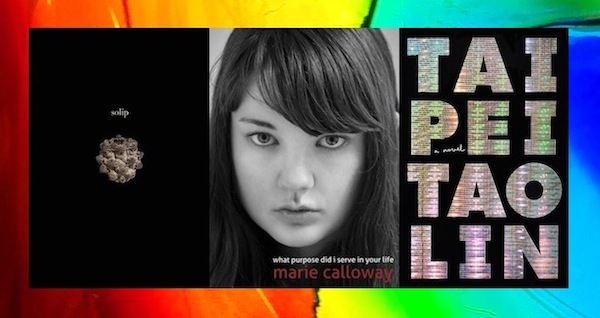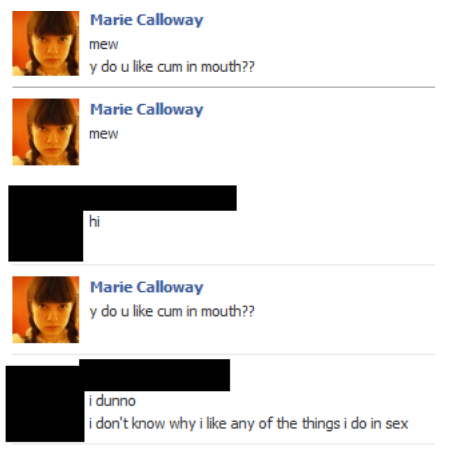Comment on This Post: Giant Triple Threat Giveaway (Ken Baumann, Marie Calloway, Tao Lin)
I know there was a Tao Lin post x hours ago, but I don’t care. I have books to give away. Want to win free books? Want to grumble? Comment on this post to get one of these:

FIRST PRIZE goes to the commenter with the best* comment
SECOND PRIZE goes to the commenter with the worst* comment
THIRD PRIZE goes to the commenter who makes the MOST* comments (bonus for over 100)
each prize will be selected randomly from the (pictured) prize pool of:
Solip by Ken Baumann
what purpose did i serve in your life by Marie Calloway
Taipei by Tao Lin
*as calculated by me
(for the curious, the reason I have these books is that I pre-ordered two out of the three, then received ARCs. i bought two copies of Ken’s because I knew it would be badass)
25 Points: what purpose did i serve in your life
 what purpose did i serve in your life
what purpose did i serve in your life
by Marie Calloway
Tyrant Books, 2013
200 pages / $19.00 buy from Amazon or SPD
1. A link to Frank Hinton’s review from a few weeks ago.
2. Sex Writer Marie Calloway Addresses Dr. Phil Controversy Live
3. “I started to wonder, and felt relieved that there might be truth to the idea of intellectuals all being frauds. I knew that I certainly was.”
4. Some old links [TRIGGER WARNING: “journalism”]: 1, 2, 3, 4, 5, 6
5. I don’t know if Marie Calloway’s writing is unique, but I know I haven’t read anything like it. Have you?
6. “I wondered if maybe men are incapable of understanding something like this as anything other than something that’s meant to get them off.”
7. I’ve been thinking about how subjective the idea of “degradation” is, unless we’re talking about soil erosion or something.
8. 
9. I’d be curious to read a story that was “completely incomprehensible to men,” especially if Marie Calloway wrote it.
10. It’s funny how such clear, direct prose has resulted in so many people missing the point entirely. READ MORE >
May 26th, 2013 / 9:59 pm
25 Points: what purpose did i serve in your life
 what purpose did i serve in your life
what purpose did i serve in your life
by Marie Calloway
Tyrant Books, 2013
200 pages / $19.00 buy from Amazon or SPD
1. The film The Hurt Locker opens with the quote “The rush of battle is a potent and often lethal addiction, for war is a drug.”
2. Marie Calloway’s novel what purpose did i serve in your life opens with the quote “We teach children not to go into stranger’s houses, so why do it as an adult?”
3. The film The Hurt Locker is divided into a number of distinct scenes showcasing Sergeant First Class William James’ deactivating various bombs in intense, maverick ways. The viewer is left with the post-suspense of the diffusal, the slowing of blood-pressure lets one reflect on war as the hazmat is removed.
4. Marie Calloway’s what purpose did i serve in your life is divided into a number of distinct reflections each culminating in some kind of sex which she somehow coordinates in an often intense, maverick-y way. When being degraded, she posits that she deserves it. She states she feels relief and confusion in making herself an object.
5. The movie The Hurt Locker portrays James’ fearlessness in the face of danger and ends with his inability to escape the very thing that is destroying him.
6. Marie Calloway’s novel portrays a young woman moving through life after vaguely mentioned past traumas. She is a rape victim and this shapes her sexual actions and reactions. Though often being grossed-out or averse to a range of sexual suggestions (from being eaten-out to force-fed her own vomit) Calloway’s actions are that of a compliant, non-confrontational lover.
7. In 2011, Gawker called Marie ‘just a girl, with a Tumblr’.
8. In the Jeremy Lin chapter of the book, Lin points out:
“If someone says your writing has flaws or is good, that implies they know a concrete goal that your writing has, which can be measured in numbers, and that the number would be higher or lower if you changed your writing in a certain way, I feel, by that seems incredibly hard to measure, even if two different people had agreed upon a purpose for your writing that could be measured, like ‘increases heart rate in reader’ or something. But it can be depressing to never think in terms of ‘good’/’bad’ without defining contexts/goals in each instance.”
9. A staff member of the Paris Review once told William S. Burroughs that sex seems frequently equated with death in his writing. Burroughs responded:
“That is an extension of the idea of sex as a biologic weapon. I feel that sex, like practically every other human manifestation, has been degraded for control purposes, or really for antihuman purposes. This whole Puritanism. How are we ever going to find out anything about sex scientifically, when a priori the subject cannot even be investigated? It can’t even be thought about or written about. That was one of the interesting things about Reich. He was one of the few people who ever tried to investigate sex—sexual phenomena, from a scientific point of view. There’s this prurience and this fear of sex. We know nothing about sex. What is it? Why is it pleasurable? What is pleasure? Relief from tension? Well, possibly.”
10 a. “If you like me, you have to like shyness.”
b. “I’m smart at some things but not with people or at growing up.” READ MORE >
May 9th, 2013 / 12:26 pm
My Experience Writing for Muumuu House

Wrote about Tao Lin for Hobart.
Exchanged emails with Tao about what I wrote.
Tao cut and pasted part I’d written about Zac Zellers and Marie Calloway and wrote beneath it “this seems funny to me.”
Replied with a paragraph in which I described Zac Zellers as the “Where’s Waldo” of Ann Arbor.
19 mins later got email from Tao saying “you should write something about this and send it to me.”
Popper in bed
23 brief replies to Blake Butler & Elisa Gabbert & Johannes Göransson & Chris Higgs re: (dear god, what else?) the fucking New Fucking Sincerity

ToBS R∞: Arguing in blog posts and on Facebook about aesthetics vs. Going out for a pleasant dinner together, then taking a nice walk at sunset in a park
I’ve decided that, from now on, all I’m going to write about at this goddamned site is this goddamned thing.
… No, seriously, I’m delighted that so many have chimed in. Thanks to everyone! I thought one massive reply would be easiest. If you read this whole thing, may your god shower blessings upon you. And if I missed any pertinent responses, kindly direct me to them in the comments. (I was traveling last weekend, and as such had trouble keeping up with all the discussion.)
1.
I’ve claimed (here, here, here) that one thing at stake in the New Sincerity is the discovery of what maneuvers currently count as “feeling sincere.” That such maneuvers exist I consider more an observation than a topic for debate. E.g., Blake, in his recent post about Marie Calloway’s Google doc pieces, wrote that Calloway’s recent work:
What we talk about when we talk about the New Sincerity, part 2

"Hi, How Are You?" cover art by Daniel Johnston (1983); "financially desperate tree doing a 'quadruple kickflip' off a cliff into a 5000+ foot gorge to retain its nike, fritos, and redbull sponsorships " by Tao Lin (2010)
It made me very happy to read the various responses to Part 1, posted last Monday. Today I want to continue this brief digression into asking what, if anything, the New Sincerity was, as well as what, if anything, it currently is. (Next Monday I’ll return to reading Viktor Shklovsky’s Theory of Prose and applying it to contemporary writing.)
Last time I talked about 2005–8, but what was the New Sincerity before Massey/Robinson/Mister? (And does that matter?) Others have pointed out that something much like the movement can be traced back to David Foster Wallace’s 1993 Review of Contemporary Fiction essay “E Unibus Pluram: Television and U.S. Fiction” (here’s a PDF copy). I can recall conversations, 2000–3, with classmates at ISU (where DFW taught and a number of us worked for RCF/Dalkey) about “the death of irony” and “the death of Postmodernism” and a possible “return to sincerity.” Today, even the Wikipedia article on the NS also makes that connection:
Marie Calloway’s google docs pieces

I think I really like the pieces Marie Calloway has been publishing via Google docs & sharing as links on Facebook & Tumblr post-“Adrien Brody” & “Jeremy Lin.” They are surprising and create a feeling that seems like a secret private virus or a window. There are people in the world.
Insufferable by Marie Calloway
Cybersex by Marie Calloway
Criticism by Marie Calloway
Men by Marie Calloway
Seems significantly more “sincere” in an actually vibrant way than a lot of the other things people have been pointing at as “sincere” lately. Not that I think sincerity is important, but I’m confused as to how people can point to repurposed internet-speak tumblr-timez poise as not of an extremely orchestrated intent. It’s not very interesting to watch the same buttons being pressed over and over. I like mutation. I wish there was less obvious fear.
If nothing else, these new works by Marie Calloway seem singularly her, and rapidly feedbacking at themselves in a way that wakes something else up, which is refreshing.
Theory of Prose & better writing (ctd): The New Sincerity, Tao Lin, & “differential perceptions”
In the first post in this series, I outlined Viktor Shklovsky’s fundamental concepts of device (priem) and defamiliarization (ostranenie) as presented in the first chapter of Theory of Prose, “Art as Device.” This time around, I’d like to look at the start of Chapter 2 and try applying it to contemporary writing (specifically to the New Sincerity). As before, I’m proposing that one can actually use the principles of Russian Formalism to become a better writer and a better critic.

